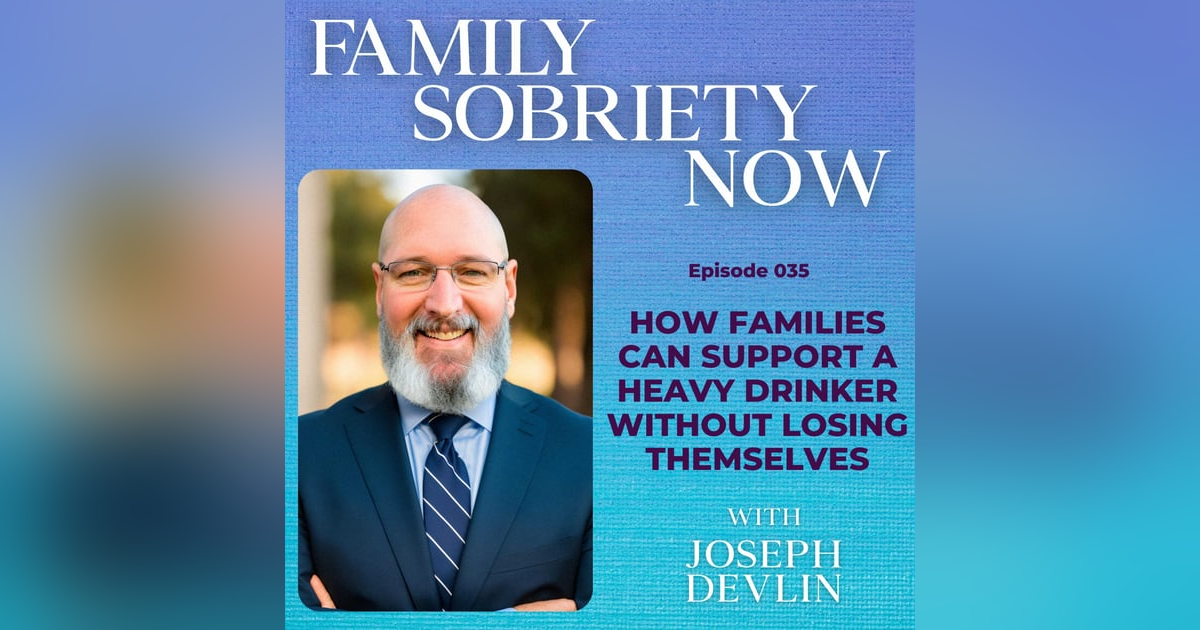How Families Can Support a Heavy Drinker Without Losing Themselves

Joseph discusses supporting heavy drinkers using three key principles. He shares stories of families who learned to support, protect and reconnect with their loved ones. Joseph emphasizes that support means walking beside loved ones without fixing them and that hope can be maintained through connection rather than perfection.
00:00 - Untitled
00:42 - Recording Started
Hello and welcome. I am your host, Joseph Devlin, and today I'm going to continue a conversation about heavy drinkers and the families who love them. Today we're going to dig deeper into how families can truly support their loved one in a healthy way, with an app without enabling losing themselves or giving up. So let's get at it.
0:32
All right. Today I want to cover three key principles, and as I'm covering the principles, I'll share like a modified short story of folks, and I'm going to just change some of the names for confidentiality reasons, so the first one, so the first point I want to look at is support without control. So I'll share the story about Maria and her son Kevin. Now Maria's son Kevin was about 2728 years old. He had been struggling with heavy drinking since college, and she tried everything that she thought to really support him. And you know, if he ran into a gym, she would be calling his job to make excuses. She would pay his rent on occasion, even dumping out his alcohol. However, nothing really seemed to change. Now, eventually, she sat down with a counselor and heard this, you can't carry him out of the darkness, but you can hold a light and wait at the edge. That changed everything for her. Instead of trying to control Kevin, Maria started supporting him in a new way. She began to develop phrases that were authentic to her, and she would say things like, I love you and I believe in you, but I won't clean up after the consequences anymore. She started to learn how to listen without fixing she also began to offer resources and not rescue missions. So one of the takeaways I want you to think about is support doesn't mean saving someone. It means walking beside them without dragging them. Heavy drinkers often respond to compassion with accountability more than commands. All right. The second point I'm looking at is boundaries over ultimatums. This story is about Mike and his wife, Jenna. Now Mike's wife Jenna had become a daily drinker. He was angry about this. He was also scared and tired of the empty promises. One night, he said, If you don't stop, I'm leaving tomorrow.
3:15
But the next day, nothing happened.
3:19
Jenna kept drinking, and Mike felt powerless.
3:24
Eventually, he learned the difference between
3:27
ultimatums and boundaries. Instead of threatening, he calmly said, I love you, but I won't stay in the same bedroom when you've been drinking. And if this continues long term, I'll need to leave for my own peace. And here's the thing, he followed through, not to punish her, but to protect himself and invite her to face their reality.
4:04
Takeaway here is ultimatums
4:06
are threats. I know many of you know that you know and but there is that fine line between that ultimatum and boundary, and boundaries are decisions you make to protect your heart, your home and your hope. Boundaries often do what yelling never can. They can give the other person space to feel the consequences and choose Change. And here's our third point, hope through connection, not perfection. This story is about Tasha and her father. Now, Tasha she grew up in a very toxic home where her dad drank heavily and. As an adult, she distanced herself, but eventually she came around. She reached out again, not because he had gotten sober, but because she healed enough to be able to say, Dad, I miss you. I don't like your drinking, but I love you if you're ever ready for help, I want to walk the road with you. That conversation didn't change him immediately, but it started something. It reminded him he wasn't forgotten.
5:44
Here's something for you to think about.
5:47
You don't need to wait for perfection to reconnect. You can hold hope, keep boundaries and still choose relationships when it's safe sometimes, just knowing that someone still sees the person behind the problem can ignite a desire for change. All right, so as we're coming to our end here, let's just do a quick recap and the principle of support without control, says I'm here, but I can't do this for you. Boundaries over ultimatums says this is how I'll protect myself no matter what you choose. And hope through connection says you are more than your drinking. I believe in who you can become. If you're walking through this with a loved one, please know you are not alone. Your role isn't to fix them. Is to stay grounded in truth, love and clarity. Jesus didn't fix everyone in an instant. He walked with people, he asked questions, he spoke truth and love, and then let them choose.
7:14
And so can you,
7:18
if you would like, guidance on how to implement these principles, how this can be more impactful with the use of affective, heartfelt phrases and other questions that help you and your loved one with safer, more connected communication, reach out to me, and I would be happy to be of service. Thanks for being here today. If this helps you, send it to someone who needs it. And remember, hope is never wasted until our next connection. Remember, sobriety is a family affair.


